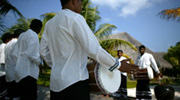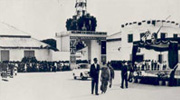The latest archaeological evidence suggests that the Maldives islands were first inhabited in around 1500 BC. It seems likely that the islands were first permanently settled by Aryan immigrants who are also believed to have colonized Sri Lanka at around the same time. Subsequent migrations at regular intervals, from Southern India and Sri Lanka, served to further expand the population of the Maldives.
Documented contact with the outside world began around 947 AD when Arab travellers began visiting the islands. Arab and Persian traders soon began arriving in large numbers, attracted to the Maldives by the abundance of pearls, spices, coconuts, dried fish and, in particular, cowry shells (which were accepted currency from Africa to China until the sixteenth Century). These traders profoundly influenced Maldivian society and culture, with perhaps their most significant impact being in the religious sphere – the Maldives officially converted to Islam in 1153 AD.
After the conversion to Islam, rulers of the Maldives islands came to be called Sultans. King Koimala was renamed Sultan Mohammed-bin-Abdullah and his Maley dynasty ruled the Maldives for 235 years under 26 different Sultans. Maley rule was followed by the Hilali dynasty which held sway for over 170 years under 29 different Sultans. It was during Hilali rule (and in particular the reign of Sultan Kalhu Mohammed) that foreign powers were first invited to the Maldives to establish diplomatic and commercial relations – thus opening up the “pearls of the Indian Ocean” to the outside world.
However, the Maldives was to discover that the interests of foreign powers are rarely benevolent. In the mid-16th Century, Portugal invaded the Maldives and defeated Sultan Ali VI, the last ruler of the Hilali dynasty. Portuguese rule lasted for 15 years until they were eventually defeated by one of the Maldives’ greatest national heroes, Mohammed Thakurufaan. The dynasty established by Mohammed Thakurufaan – the Utheemu dynasty – was to rule the Maldives for the next 127 years (under 12 different Sultans) until the early 18th Century when foreign powers again began to turn covetous eyes on the islands. This time the threat came from the south coast of India from where the Raja of Cannanore dispatched a Malabar raiding party to attack Male. Although Maldivian forces eventually repelled the Malabar forces, the Utheemu dynasty collapsed and was replaced by the Huraage dynasty under the leadership of Ghazi Hassan Izzaddeen (which prevailed until 1968).
After the Malabar attack, the Maldives established diplomatic relations with Sri Lanka – an alliance that continued throughout the latter’s Dutch and then British colonial periods. In 1887, the Maldives became a British Protectorate and remained so until 26 July 1965. On 11th November 1968, the Sultanate was replaced by an independent Republic of Maldives.
.jpg)





